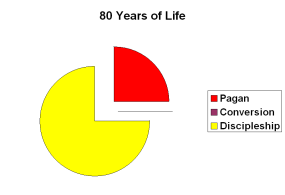Out of Ur posed an intriguing question a few weeks ago. I intended on writing about it, but time got away from me. Since then, that post, "Have We Become Crypto-Christians?," has taken on a life of its own in the Godblogosphere. I've encountered it at a dozen or more sites.
The setup of the post follows the rise of Christianity in 16th century Japan and its subsequent brutal extermination by warlords. To survive, the handful of Christians who remained hid their faith and practice within Japanese culture so well that when Japan re-opened to the West in the late 19th century, that tiny remnant still remained. However, the centuries of dalliance with the culture had so metamorphosed the faith of those Japanese Christians that missionaries barely recognized it for what it was. This Crypto-Christianity, as it was called, bore little resemblance to orthodox Christianity.
It's a good story. Makes for an obvious warning, too.
But there's a problem.
Any scientist worth his PhD will tell you that an experiment is only as good as its control. Without a control in place, results can't be measured accurately.
For centuries, the idea that life sprang from non-living matter (spontaneous generation) ruled science. Put a piece of bread in a container and miraculously fungi would arise from within it. Where did the fungi come from? They spontaneously generated from the bread.
Obviously, any science devoted to studying biological systems would be hampered by this erroneous notion. That it took until the middle of the 19th century to finally lay it to rest showed the intractability of disproving it. Only through a well-conceived experiment (by a young Louis Pasteur) and a proper control could valid conclusions be drawn. Heat a flask with an ingenious S-shaped trap in its neck (to let in air, but trap external airborne microbes) and compare it against a flask without the trap. The first remained sterile, while the other allowed airborne microbes to settle, giving rise to life.
The problem with the Crypto-Christianity post and its troubling question of altered Christianity is the same that bedeviled scientists searching to disprove spontaneous generation: no proper control existed.
When missionaries returned to Japan in the late 19th century, were they the control? Was their Christianity the pure unadulterated form practiced by the first century Church?
Hardly.
While this does not mean they had no ability to say that Crypto-Christians of Japan practiced an aberrant form of Christianity, their ability to judge was severely limited by their own conceit that they alone were practicing the pure Faith.
We Americans suffer from this delusion that we are the pinnacle of any particular cultural expression seen as worthwhile.  It's the very backbone of the concept of "The Ugly American." And we show few signs of abandoning this delusion.
It's the very backbone of the concept of "The Ugly American." And we show few signs of abandoning this delusion.
Because the Church in America is made up of Americans steeped in this mentality, Christians here act is if we're the control for all of Christianity worldwide. Nowhere is this conceit more grounded than in Evangelicalism. For Evangelicals go to great lengths to assert their superiority over the rest of the American Christendom, creating a king-of-the-hill bravado. Needless to say, this not only bothers other Christian sects worldwide, but even other Evangelicals outside of America.
So we consider ourselves the control portion of the experiment. Any results we gain from any experiment in the Faith must be measured against us.
Does that bother anyone else? I'm livid over it, frankly, because it's so inherently self-centered. Not only this, but the tendency is to denigrate the Christians who came before us, as if they were practicing a kind of Preschool of the Faith. They were the devolved Australopithecines and us the fully realized Homo Sapiens. As such, they have nothing to teach us.
Oversimplification? Stay with me.
Let's consider Protestantism, especially those sects within it that trace their founding to the Reformation. When we encounter doctrinal discussions within those sects, it's as if a vast amnesia occurred between the time the Apostle John drew his last breath and Martin Luther pounded his 95 Theses to the cathedral door. Sure, a few councils dealt with Pelagianism and Sebellianism and a few other -isms, but for the most part, the Roman Catholic Church ruled for a thousand years, and we all know NOTHING of any theological worth happened in that millennium.
Mark Lauterbach recently posted excellent insights into this theological blindness. He decided to break the artificial barrier of the Reformation by reading many of the earlier Church fathers. In particular, he notes that Athanasius teaches using metanarrative and avoids the individualism we inherently lay over the Gospel message. Mark ends his post with a warning from C.S. Lewis to avoid reading these great men of God through any of our contemporary lenses lest we warp their teaching to fit our own.
Which is what we do all too easily.
In the end, the battle here resembles the one between the Chihuahua and the Great Dane over who is the real Canis lupus familiaris. When seen from the outside, neither looks much like the original dog they descended from.
Yet we American Evangelicals have these blinders on prevent us from considering that perhaps we are not the ne plus ultra of Christian expression. If we actually encountered a real first century Church practicing within our midst, I would say that many of us would consider it deviant. Not so? Look how easily some of us attack other Evangelicals who contend they're trying to get back to that first century ideal.
Have we become Crypto-Christians? I'd say that long slide toward some level of cryptic faith started just a few years after Pentecost. The question of what is normative is a difficult one because culture intrudes so easily, especially in practice. Just witness the extremes of practice within orthodox Christianity today and ask why they deviate so wildly.
In the end, the question is a red herring. We American Evangelicals already are and probably have been Crypto-Christians for a very long time. Yet somehow, we continue to think of ourselves as the standard by which all Christianity is measured, both past and future.
Is that a Chihuahua I hear yapping?
{Image: Elliott Erwitt's classic Felix, Gladys, and Rover, 1974}

